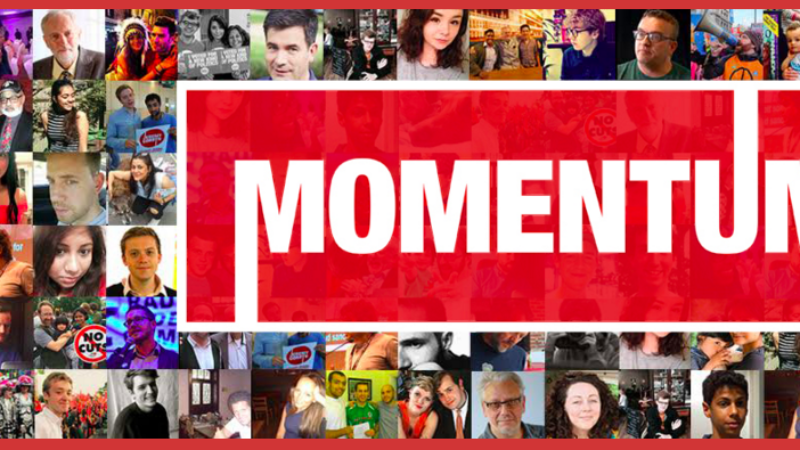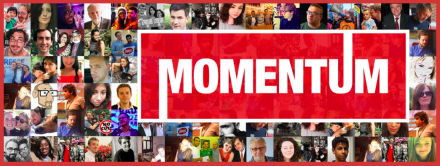

It’s only been two weeks since Momentum won a decisive extra three seats on Labour’s NEC but the hubris that has afflicted them since then has been staggering and carries in it the potential seeds of their own self-inflicted political destruction.
When the history of the Momentum insurgency is written, its downfall may well be traced to this victory, the product of an election they precipitated, and the overconfidence it engendered. In the 1980s their Bennite predecessors’ failure can also be traced to an election they called, their challenge to Denis Healey for the deputy leadership, though in that case it was defeat rather than victory that was their undoing.
In just two weeks, Momentum’s hubris has led them into unnecessary fights with three key groups within the party, none of which was looking for a scrap.
Only 24 hours after their election victory, Momentum removed Ann Black as chair of the NEC disputes committee and replaced her with Christine Shawcroft.
Ann Black is the most popular member of the NEC with ordinary members, securing 100,999 votes in 2016 and 301 CLP nominations. She has served on the NEC since 2000, always elected on the Centre Left Grassroots Alliance slate with the very people who have now moved against her and – as the biggest vote-winner on their ticket – she has helped to get them elected.
In policy terms Black holds most of the same positions that Momentum do, for instance opposing Trident renewal and advocating for the Palestinian cause. But culturally she comes from the soft left, the section of the party that is most pluralistic and open to working across factional lines.
Under Blair and Brown, she was a constant, though polite and constructive, thorn-in-the-side of the leadership, exposing stitch-ups in selections and other internal processes and consistently protecting the democratic rights of members and CLPs. She carried on playing the same role under Corbyn, trying to keep the party pluralistic and resist over-weaning power for the majority faction. So they summarily removed her from doing a job everyone agreed she was doing well and which, given it involves resolving disciplinary disputes, her reputation for fairness was a huge asset in.
Axing Ann Black, their doyenne, has let the wider soft left know that despite their proximity to Momentum on policy, their cultural identification with the left, and their aversion to unnecessary internal conflict, they are persona non grata for Momentum, and on the list to be removed from positions of influence in the party. Momentum has made it clear that the soft left belong where Trotsky put the Mensheviks: “You are pitiful, isolated individuals! You are bankrupts. Your role is played out. Go where you belong from now on – into the dustbin of history!”
People shoved aside in this way can either accept their defeat or fight to survive. The instinct to survive politically is a powerful one.
The soft left is not some small sliver of Labour opinion, it probably represents 50 per cent of the membership, including a majority of those who voted for Jeremy Corbyn in 2015 and 2016, and a large proportion of the PLP.
The failure of Bennism in the 1980s can be linked to two key moments of soft left rupture with the hard left. First, the decision of Neil Kinnock and other Tribune Group MPs to abstain in the run-off for deputy leader between Benn and Healey, which gave Healey his winning margin. Second, the “realignment of the left” when soft left grouping the Labour Co-ordinating Committee decided to throw itself behind Kinnock’s leadership and work with the right of the party rather than the hard left, which decisively altered the grassroots balance of power.
Why – other than hubristic arrogance – when the soft left had always been happy with Corbyn’s policy agenda, and since last summer have also been content with his leadership, would Momentum drive them out of their coalition?
The second unnecessary fight was more obscure and less-reported but perhaps more significant, and occurred at the organisation committee, on the same day as the disputes committee, and then again under “any other business” at the full NEC a week later. Momentum chair Jon Lansman proposed that instead of the trigger ballot for the Mayor of Newham being re-run, there should be a move straight to a full selection. This would effectively have removed the trade unions and socialist societies from the process, as they have a lot of votes in the trigger ballot. The unions were understandably enraged and voted down the proposal. They now see a threat in the democracy review to their role in trigger ballots for sitting MPs, where they see themselves as the guardians of the stability of the party and rightfully entitled to a say in who represents a party in parliament that wouldn’t exist if they had not created and funded it.
Kevin Maguire has analysed the emerging faultlines between Momentum and the unions and concluded in a PoliticsHome piece “there is trouble ahead”.
Why would Momentum pick a fight with and try to reduce the institutional power of the unions when again, like the soft left, they have no policy or ideological bone to pick with Corbyn, are reconciled to his leadership, are averse to unnecessary conflict, and find the factional divisions between CLP activists meaningless?
The unions hold 13 seats on the NEC (14 with the treasurer) and 50 per cent of the votes (with the small socialist societies) at annual conference. It is nearly impossible to change party rules without their support. Why would you alienate them, unless again it is sheer arrogant hubris?
The final battle has been with local government. The moderate council leadership in Haringey has already been defeated. Most of their councillors have been deselected or hounded into retirement by Momentum. Their controversial flagship Haringey development vehicle regeneration policy would have been scrapped at the first meeting after this May’s elections. But the hard left ploughed in at last week’s NEC meeting with a proposal to put national pressure on Haringey to abandon its policy now, even while a majority of the current Labour group support it. This was amended to just sending in national figures to carry out arbitration between the two sides locally, but the signal had already been sent to Labour local government.
Only a week before Jeremy Corbyn is due to address Labour councillors at the party’s local government conference, more than 70 Labour council and group leaders sent a public letter of protest to the NEC, which received widespread coverage in the Sunday Times.
Again, councillors don’t have a big policy gripe with Momentum and are reconciled to Corbyn’s leadership. Council leaders don’t like to be dragged into factional warfare, they are too busy running large complex organisations, and need to work with councillors and party members from all wings of the party.
The majority of Labour councils are keen to pursue policies that reverse outsourcing and reliance on the private sector, so Haringey’s regeneration partnership with Lendlease was seen as something of a policy outlier, though one within the spectrum of options Labour councils consider, and with some sympathy for Haringey needing to find radical solutions because of the sheer scale of the housing stock it needed to upgrade.
So the anger within Labour local government was not about the policy, it was about the interference by a national body, the bullying of people who had already been defeated and deselected, the backseat driving by people considering a resolution proposed on the day of the meeting to try to override years of policy development. The entire philosophy of Labour local government has been about localism – specific local solutions developed to local problems – and devolution. A centralist diktat is the opposite of this approach.
Councillors don’t have lots of votes in Labour’s structures, they are only one per cent of the membership. But they do have a lot of soft power. What city leaders say is news nationally, regionally and in their own areas. They have a platform at local party meetings. They provide the structural backbone of Labour’s campaigning. And the levy paid by all Labour councillors is a big share of the national party’s income and particularly that of local parties.
Why pick a fight with people who want a quiet life and to be left to do the job they were elected to? Again, hubristic arrogance.
Until the point of his election to the NEC on January 15, Jon Lansman has played the last two and a half years in the Labour Party like a masterclass in strategy and tactics. Victory seems to have gone to his head and in just two weeks he has picked three unnecessary fights which in combination he might not be able to win. Nemesis beckons.




More from LabourList
Almost half of Labour members oppose plans to restrict jury trials, poll finds
‘How Labour can finally fix Britain’s 5G problem’
‘The University of the Air – celebrating 60 years of Harold Wilson and Jennie Lee’s vision’